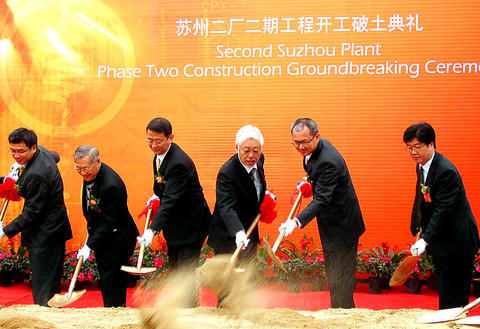Yageo Corp (國巨), the nation's largest passive components service provider, yesterday celebrated its 10th anniversary in China by opening its second plant in Suzhou, saying it aims to become an industry leader.
The Second Suzhou Plant will become the world's largest single passive component back-end production line, with monthly capacities of resistor chips (R-Chips) and multilayer chip capacitors (MLCC) reaching 36 billion and 11 billion pieces respectively by the end of next year, the company said in a statement.
"Yageo launched operations in China in 1996 and, in 10 years, we've established a complete production, sales and logistics network in southern, eastern and northern China, creating the world's largest passive component supply chain," chairman Pierre Chen (

PHOTO: CNA
In the Chinese market, Yageo has assumed the No. 1 position in R-Chips, with a 39 percent market share, and the second position in MLCC, with a 19 percent share, behind Japan's Murata electronics Co, the company said.
Yageo plans to boost its monthly capacity of R-Chips to between 44 billion and 45 billion pieces, and that of MLCC to between 22 billion and 23 billion pieces, by the end of next year, Chen said in an interview with the Central News Agency.
"Demand is strong and our target of NT$50 billion (US$1.54 billion) in revenue in three years has not changed," Chen said.
Yageo's sales for last year grew by 23 percent to NT$20.39 billion. For the first nine months of the year, the company's revenue increased by 11 percent from a year ago to NT$16.66 billion.
Yageo yesterday broke ground for the second phase of construction at the Second Suzhou Plant. The capacity expansion is necessary to keep pace with customer demand, in particular from the rapidly expanding Chinese market, it said.
More than 50 percent of Yageo's revenue comes from China, and the percentage is expected to increase to 75 percent in the next three to five years, Yageo CEO David Huang (
Driven by strong global demand, shipments of laptop computers, mobile phones and LCDs will increase by 22 percent, 10 percent and 3 percent respectively next year, said Ting Chung-yi (丁忠儀), Yageo's general manager of China Operations.
Growth in the Chinese market will outpace that in the global market as a result of surging domestic demand and business opportunities brought about by next year's Beijing Olympics, Ting said. Yageo predicts 40 percent and 20 percent increases in Chinese sales of notebook computers and mobile phones respectively, and 67 percent for LCD TVs next year, Ting said.
To consolidate its leading position, Yageo said it would build a third research and development center in Suzhou to complement those already in the Netherlands and Taiwan.
Meanwhile, to expand sales channels in China, Yageo's board yesterday approved a proposal for the company's subsidiary, Yageo Holding (Bermuda) Ltd, to invest approximately US$3.2 million in Ko-E Holding (
Shares of Yageo closed up 2.43 percent at NT$12.65 on the Taiwan Stock Exchange yesterday.

SEEKING CLARITY: Washington should not adopt measures that create uncertainties for ‘existing semiconductor investments,’ TSMC said referring to its US$165 billion in the US Taiwan Semiconductor Manufacturing Co (TSMC, 台積電) told the US that any future tariffs on Taiwanese semiconductors could reduce demand for chips and derail its pledge to increase its investment in Arizona. “New import restrictions could jeopardize current US leadership in the competitive technology industry and create uncertainties for many committed semiconductor capital projects in the US, including TSMC Arizona’s significant investment plan in Phoenix,” the chipmaker wrote in a letter to the US Department of Commerce. TSMC issued the warning in response to a solicitation for comments by the department on a possible tariff on semiconductor imports by US President Donald Trump’s

‘FAILED EXPORT CONTROLS’: Jensen Huang said that Washington should maximize the speed of AI diffusion, because not doing so would give competitors an advantage Nvidia Corp cofounder and chief executive officer Jensen Huang (黃仁勳) yesterday criticized the US government’s restrictions on exports of artificial intelligence (AI) chips to China, saying that the policy was a failure and would only spur China to accelerate AI development. The export controls gave China the spirit, motivation and government support to accelerate AI development, Huang told reporters at the Computex trade show in Taipei. The competition in China is already intense, given its strong software capabilities, extensive technology ecosystems and work efficiency, he said. “All in all, the export controls were a failure. The facts would suggest it,” he said. “The US

The government has launched a three-pronged strategy to attract local and international talent, aiming to position Taiwan as a new global hub following Nvidia Corp’s announcement that it has chosen Taipei as the site of its Taiwan headquarters. Nvidia cofounder and CEO Jensen Huang (黃仁勳) on Monday last week announced during his keynote speech at the Computex trade show in Taipei that the Nvidia Constellation, the company’s planned Taiwan headquarters, would be located in the Beitou-Shilin Technology Park (北投士林科技園區) in Taipei. Huang’s decision to establish a base in Taiwan is “primarily due to Taiwan’s talent pool and its strength in the semiconductor

French President Emmanuel Macron has expressed gratitude to Hon Hai Precision Industry Co (鴻海精密) for its plan to invest approximately 250 million euros (US$278 million) in a joint venture in France focused on the semiconductor and space industries. On his official X account on Tuesday, Macron thanked Hon Hai, also known globally as Foxconn Technology Group (富士康科技集團), for its investment projects announced at Choose France, a flagship economic summit held on Monday to attract foreign investment. In the post, Macron included a GIF displaying the national flag of the Republic of China (Taiwan), as he did for other foreign investors, including China-based